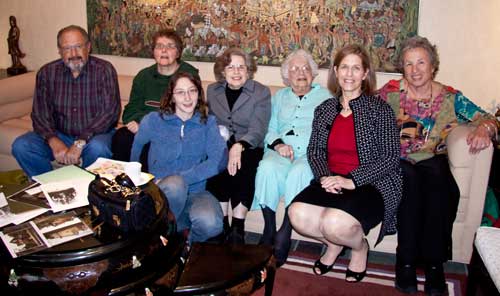
ADDENDUM TO THE MILAVITZ FAMILY HISTORY
BARUCH
SHOEL MILAVITZ m.
Raiza
1.
Shopse “Sam” d. 11-8-1920
2.
Hyman “Molewitz” b. 1856 d.1934
3.
Solum Shale “Salum” b. 1858 d. 1917
4.
Francis “Bruena Freda Fanny” b. 1861 d. 1931
5.
Anna “Chana Baila” b. 1861 d. 1951
6. Rachel Layah “Lena” b. 1873 d.1933
Below is a census list from 1858 in Kavarskas, Ukmerge, Kaunas,
Lithuania. Indicates that when
this was done, Baruch, his wife Reyza, his brother, Yankel and his wife, Sora
are listed as missing.
|
|||||||||||||||||||||||||||||||||||||||||||
Memories of Edna Engelson and Elaine Aronson
On May 1, 2009, Edna Engleson, Elaine and David Aronson, Kay Ruth Weber, Miriam Weber (came later), Lanny Berke, Leighton and Dianne Siegel and Sharon Winer, daughter of Julius Weiner gathered for conversation. The following are some of the stories and memories that were gathered at that time by note takers Sharon Winer and Dianne Siegel. Elaine Aronson brought old family photos and Sharon Winer brought memories of her family, all of which can be seen by clicking here.
 |
|---|
|
While
in Russia, Mary saved a young Kaner boy. She sewed uniforms for the Cossacks. One day she overheard two Cossacks discussing that they were
going to the next town to in script a young Kaner boy. She sent two of her daughters
running to the family to warn them and to arrange to send the boy to the United
States. It worked as he made it to
Superior. Unfortunately, he
scuffled with a Cossack as he was getting on the train and lost an eye. In later years Elaine Aronson
coincidentally met the granddaughter of that very man.
Shopse
settled in Superior, Wisconsin because relatives named Zalk and Joseph were
already living there. Shopse was
remembered as a very handsome man with a red beard. His nickname was Shopse the redhead, but said in
Yiddish. He kept sending money to
Mary and encouraging her to join him. She was apparently using the money to find husbands for her daughters. Finally, a letter was sent saying that
Shopse was very ill and needed her. Mary then came and brought the rest of her children. Mary was described as quiet and
smart. The story about Shopse
being ill, was just a ruse. Shopse
worked on the wharfs as a longshoreman while learning English. He eventually was in charge of the city
dump and later in life he and Mary had a rooming house. One of his boarders was Morris Berger
who later married Esther Milavitz, Elaine Aronson’s grandparents. Edna remembers that he would
bring her trinkets that he found at the dump. Edna said that they had a cow named Bessie. She provided them with milk and the
cream was eaten with bread.
Edna
recalled that John Siegel also milked a cow in Eveleth for fresh milk. In Eveleth, John’s mother, Pia,
made cheese and a Catholic priest would come by for her cheese, which reminded
him of what he had in Europe. He
wouldn’t enter a Jewish house, but would stand outside the fence to wait and
talk.
There
was a whorehouse in Superior. Both
Elaine and Edna remembered a cousin Izzy who was a colorful bootlegger and had
a wife, Molly, who might have been the madam. She was very beautiful with a “painted face” and furs. She sat in the women’s section of the
synagogue, but was ignored by the rest of the women.
In
those days, Eveleth and Superior were far enough apart so that there wasn’t a
great deal of visiting back and forth. But it seems there was some, since Shopse and Mary were in Superior
while part of the family was in Eveleth.
Shopse died of a heart attack in
1920. He was buried in the
Superior cemetery.
The
reason that the family settled in Superior, instead of Duluth, was that the
rents were cheaper. Duluth was
booming because of the Iron Range. In Superior there were three synagogues – Russian, Lithuanian and
one other. There was also a mikvah
and the families kept kosher. They
were Orthodox, but not rigidly so and the parents all spoke Yiddish. The Hebrew school was in a red
shed next to the synagogue.
Elaine
remembered that it was a treat to visit Tanta Hona Bela, Shopse’s sister, who
lived three or four blocks from the shul on John Avenue near Hammond
Avenue. The children were always
on their best behavior. Perhaps
John was named after the Avenue?
After
Shopse’s death, Mary went to live with her youngest daughter Mamie Milavitz
Soloski. Mary died in
1934.
Julius
Winer’s father, Israel, was well educated in the Talmud and very
religious. He was a mohel and
koshered meat. He would ride out
on horseback to perform his duties in small towns around Eveleth.
Ben
Milavitz made beer during prohibition. One night the family heard what they thought was gunshots in the
house. Ben had a gun, but probably
didn’t know how to use it. Nonetheless, he and the rest of the family crept downstairs and ---
found that the beer bottles were exploding. It happened again when the family made root beer.
Once
a peddler came along and sold Ben a barrel of what he thought was whisky. They had given him a taste and he
agreed it was whisky. However, the
thieves had a barrel inside a barrel. The small barrel out of which they gave tastes was whisky, but the big
barrel sold to Ben was water, as he soon discovered after taking it to the
speakeasy. He was out a fair
amount of money.
RECORDS FROM JEWISH CEMETERY IN SUPERIOR, WISCONSIN ARE FOUND ON THIS WEB SITE:
Albin, Anna P., Arnold B., Benjamin, Deborah (Bubley), Hymen,Mary, Sabsa, Sarah, Sheridan A., and Sigmund.